In the News
APF Canada's media responses to the latest issues and events in Asia presented in chronological order
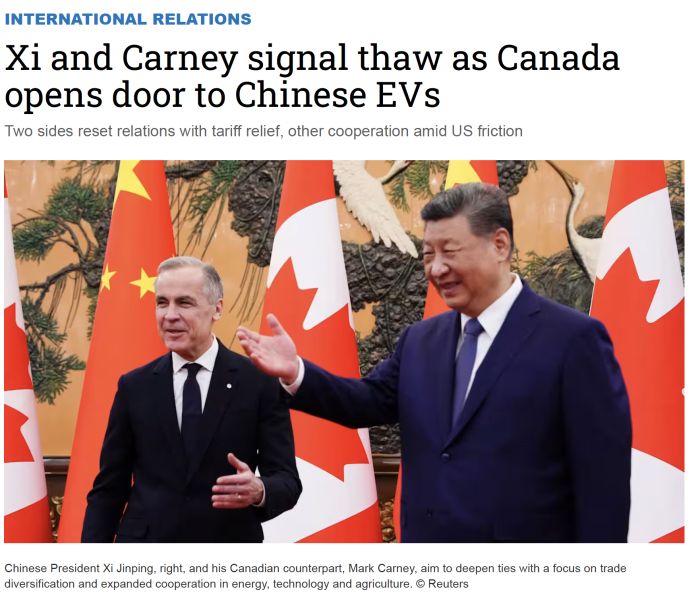
Nikkei Asia
Xi and Carney signal thaw as Canada opens door to Chinese EVs
Nikkei Asia, January 16, 2026
Featuring Vina Nadjibulla, Vice-President, Research & Strategy, APF Canada
Excerpt: Nadjibulla observed: "Forging a 'new strategic partnership' with China was a bold and risky move on the part of Prime Minister Carney. President Trump's reaction signals that for now at least Carney's bet was the correct one."
Still, other risks remain, she said. "Deeper engagement with China brings the potential for strategic dependence, political pressure and national security challenges." Canada has long benefited from strong economic ties with the U.S.... on the other hand, its ties with China have been rocky, particularly after the 2018 detention of Huawei executive Meng Wanzhou in Canada and the subsequent jailing of two Canadians on espionage charges.
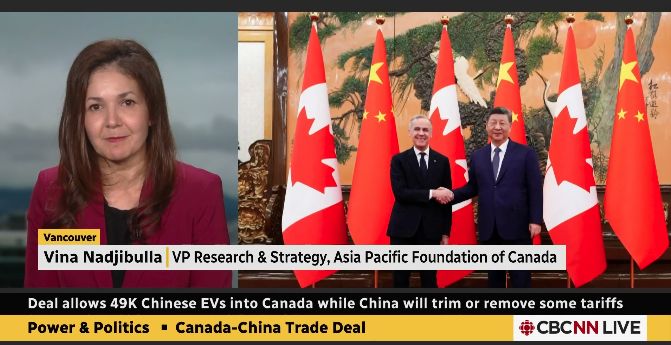
CBC Power and Politics
Deal Allows 49K Chinese EVs into Canada While China will Trim or Remove Some Tariffs
CBC Power and Politics, January 16, 2026
Featuring Vina Nadjibulla, Vice-President, Research & Strategy, APF Canada
Excerpt: Nadjibulla says the newly announced trade deal with China signals a "consequential day for Canada-China relations . . . we were talking about how this is going to be a diplomatic tightrope for the Prime Minister. Well, it looks like he has successfully navigated it and has taken some really bold and risky moves."
However, she add that discussion on the "potential economic opportunities coming" should also be tempered with understanding the "serious risks, both in terms of our engagement with China... [and] with the U.S. in terms of how this will play out . . . [O]n balance, I think we should really see this as a fundamental reframing of how Canada will be approaching its relationship, not just with China, but actually more generally."
“This is not a free trade agreement or any kind of trade agreement as we understood before, and this is not even a strategic partnership like we had understood before... this is something new and different, and there needs to be a lot of explaining of how exactly this will serve our interest.”
(Segment begins at 1:17:40 mark)

CTV Power Play
Canada Allowing 49K EVs in Exchange for Reduced Tariffs
CTV Power Play, January 16, 2026
Featuring Vina Nadjibulla, Vice-President, Research & Strategy, APF Canada
Excerpt: "This was a huge move on the geopolitical chessboard by Prime Minister Carney. A bold one, a daring one, and not just the deal on EVs and tariffs, but the announcement of this new strategic partnership with China, which obviously will bring with it some economic opportunities, especially in the energy sector as well as agriculture.
"But it also carries with it risks, risks that are inherent in engaging with China, but also risks in our discussions with the US. We will see where that pays off, but I think it's a reflection of just the kind of geopolitical turmoil that we're living through that Prime Minister Carney essentially made an assessment that the risk is worth taking for now, that it can be managed. We will see whether that gamble pays off."
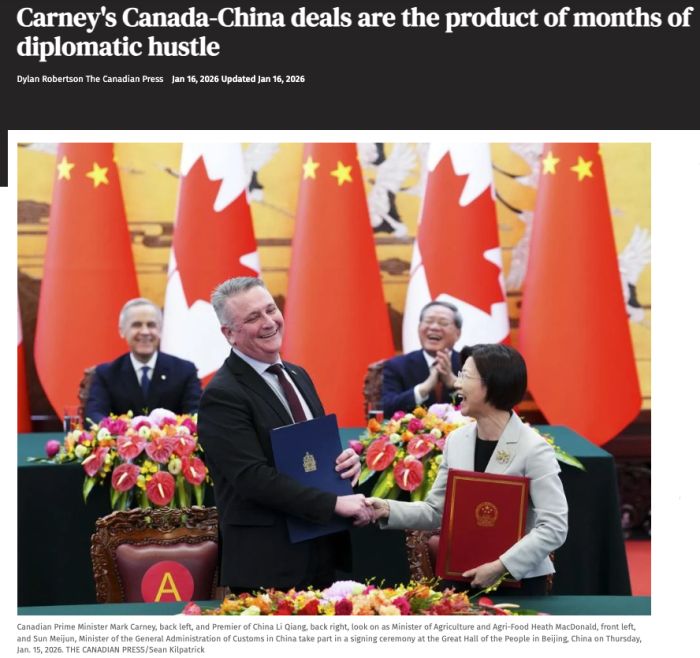
The Canadian Press
Carney's Canada-China deals are the product of months of diplomatic hustle
The Canadian Press, January 16, 2026
Featuring: Vina Nadjibulla, Vice-President, Research & Strategy, APF Canada
Excerpt:The agreements Prime Minister Mark Carney brokered over the two days of his Beijing visit are the result of months of diplomatic work and cultural knowledge, international relations experts say.
Nadjibulla says the agreements are the product of "an iterative process" of discussions between bureaucrats and political leaders that required each side to build momentum ahead of the high-level visit.
"Between these leader-level conversations that create the political space — that signal what's possible — then the working level officials, the whole machinery of government both in Canada and in China … is mobilized, to try to act on whatever commitment, whatever opening was created in those discussions among leaders."
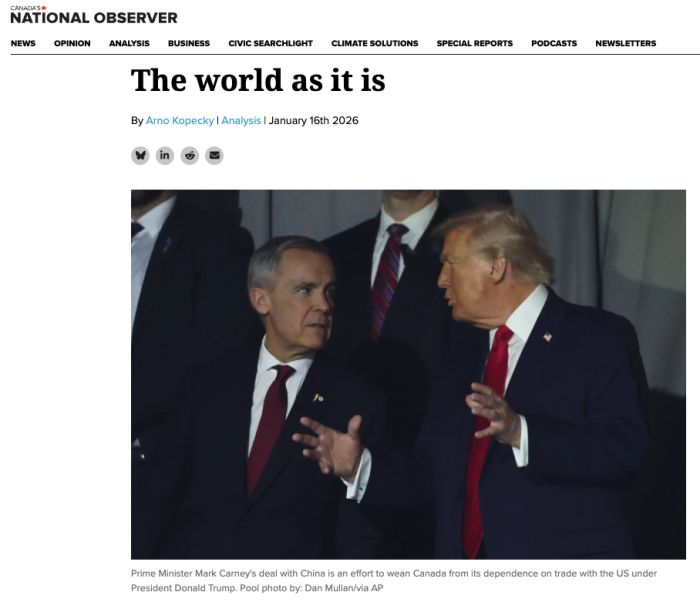
Associated Press via Canada's National Observer
The world as it is
Canada's National Observer, January 16, 2026
Featuring: Vina Nadjibulla, Vice-President, Research & Strategy, APF Canada
Excerpt: Prime Minister Mark Carney’s trip to China has illuminated the extraordinary shift in geopolitics Canada is adapting to in real time — a shift Carney alluded to in the press conference he gave at the end of his day-long meeting with President Xi Jinping: “We take the world as it is, not as we wish it to be.”
“The order that we all were enjoying existed in a large part because of U.S. power being deployed to underwrite it,” said Vina Nadjibulla in an interview with Canada’s National Observer. “That is now unravelling. What's coming in its place is unclear. It's being shaped as we speak.”
This was the not-so-subtle subtext of Carney’s China visit. Until now, said Nadjibulla, the benign protection of the United States spared Canada from having to pursue the kind of realpolitik that neighbours of powerful dictatorships have had to pursue. “We never really had the imperative to genuinely work with countries with whom we have serious disagreements,” she said.
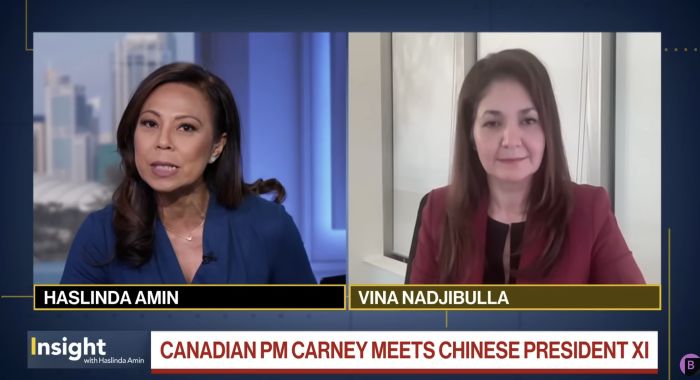
Bloomberg TV
Canada Cozies Up to China As Trump Turns Up the Heat
Bloomberg TV, January 16, 2026
Featuring Vina Nadjibulla, Vice-President, Research & Strategy, APF Canada
Excerpt: Nadjibulla emphasizes that PM Carney is looking to engage "selectively" on his visit to China, "that's why the focus very much is around laying the foundations for a new strategic partnership on economic and trade relations."
She says those specific areas are "Canada's objectives," but it is easier said than done, “because when you become more economically dependent on China... China then wants to have more political leverage [and] wants political compliance on issues it considers its core, for instance, like Taiwan and the South China Sea... how to implement that will be a big challenge."
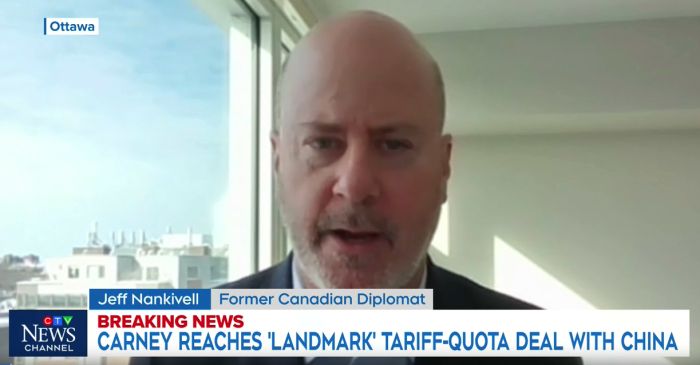
CTV News via Bell Media
Carney Reaches 'Landmark' Tariff-Quota Deal with China
CTV News, January 16, 2026
Featuring Jeff Nankivell, President & CEO, APF Canada
Excerpt: "I think we can say that the Prime Minister and his team did a very successful job of expectation management and have exceeded not only the low expectations that they were deliberately setting the last few days, but I think they've exceeded just about everyone's expectations in terms of how far they were able to go."
"They got a deal on tariffs that provides relief for some, not all, of the agricultural products affected, but the really big ones. And in turn, they've reached an agreement on electric vehicle tariffs that is very modest in scope to start with . . . but it offers the possibility of new types of investment relationships there."
"It's really a recalibration of the overall relationship . . . it does restore Canada to a normal kind of relationship of the type that every other Western country has right now with China, every major Western country."
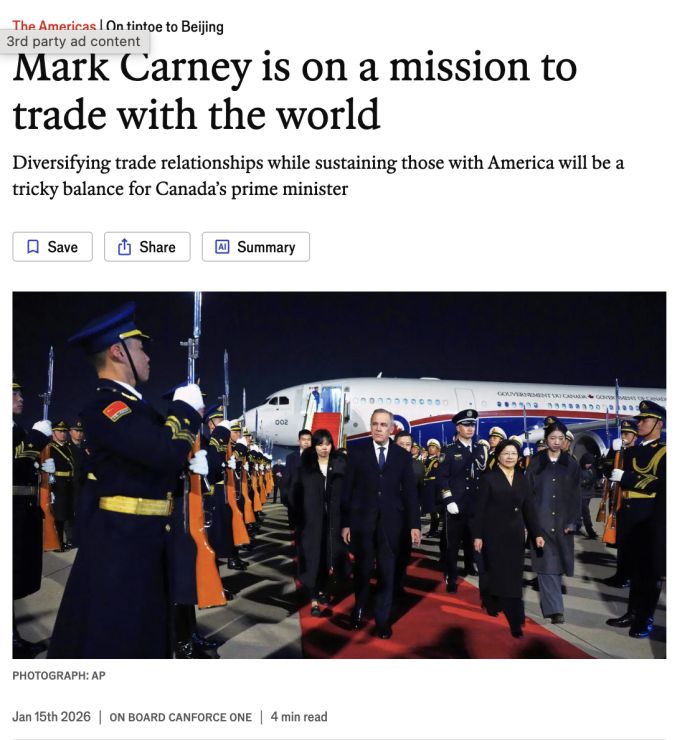
The Economist,The Economist
Mark Carney is on a mission to trade with the world
The Economist, January 15, 2026
Featuring Vina Nadjibulla, Vice-President, Research & Strategy, APF Canada
Excerpt: “The {U.S.'s] National Security Strategy crystallises how difficult it will be for Canada to pursue an independent foreign policy with China,” says Vina Nadjibulla.
“Everything Canada does will be scrutinised in Washington.”
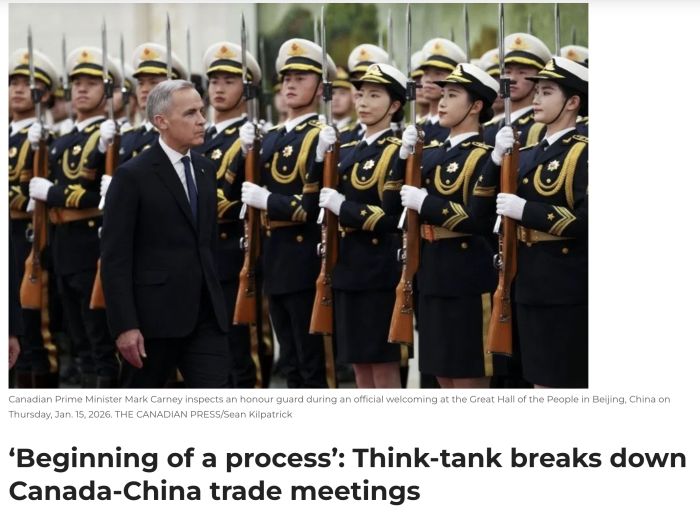
650 CKOM
‘Beginning of a process’: Think-tank breaks down Canada-China trade meetings
650 CKOM, January 15, 2026
Featuring Vina Nadjibulla, Vice-President, Research & Strategy, APF Canada
Excerpt: Nadjibulla says the recently announced MOUs between Canada and China are a sign of early and promising progress.
“What this trip has really been about is opening up opportunities and setting the political conditions for deeper economic relations in some sectors, resolving issues like tariffs on canola."
“At the same time, (they’re) still acknowledging that there are difficult issues and that there will be some issues on which there will be no engagement, like around AI or around defence-related technologies.”
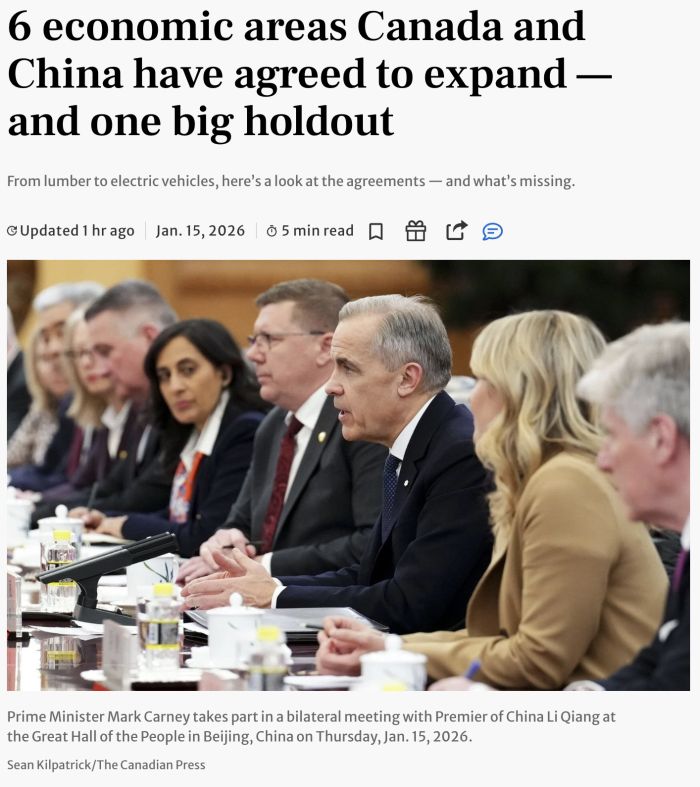
The Canadian Press via The Star
6 economic areas Canada and China have agreed to expand — and one big holdout
The Canadian Press, January 15, 2026
Featuring Vina Nadjibulla, Vice-President, Research & Strategy, APF Canada
Excerpt: The Canada-China agreements released on Jan 15 aimed at boosting bilateral trade and investment signal to Nadjibulla that "there is a desire to basically revitalize (and) restart a whole bunch of institutional mechanisms that have gone dormant over the past decade because of the strain in the relationship... All of that can be derailed if the political environment changes.”
Nadjibulla said the agreements reflect an openness and desire to explore economic co-operation. “Those details will have to be … negotiated by Canada with an eye on how they would impact discussions with the U.S.,” she added.
“We can’t just wait until everything with the U.S. is resolved before we even begin to talk to others, including others who are difficult like China.”
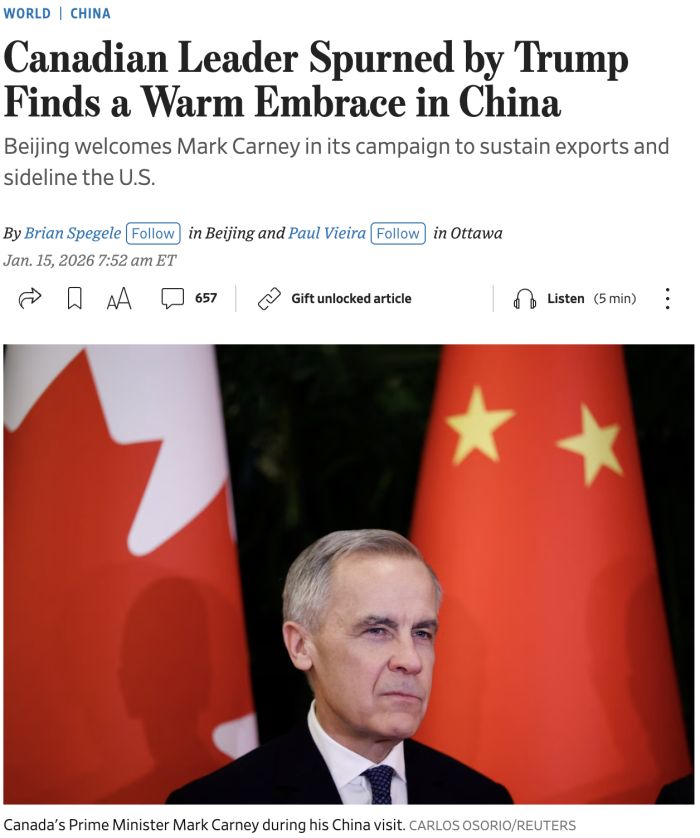
The Wall Street Journal
Canadian Leader Spurned by Trump Finds a Warm Embrace in China
The Wall Street Journal, January 15, 2026
Featuring Vina Nadjibulla, Vice-President, Research & Strategy, APF Canada
Excerpt: Nadjibulla describes the 'spheres of influence' paradigm being adopted by the current U.S. Trump Administration as “reshap[ing] U.S. expectations of allies, refram[ing] global economic competition, and redefin[ing] hemispheric security in ways that will constrain Canada’s policy space with China."
Polling data from APF Canada in collaboration with the Angus Reid Institute indicates Canadians view the Chinese government with skepticism. Only 28% of Canadians have a positive view of China, versus 59% who view the country unfavourably. Canadians would rather see Ottawa deepen economic ties with Europe and Mexico over China.
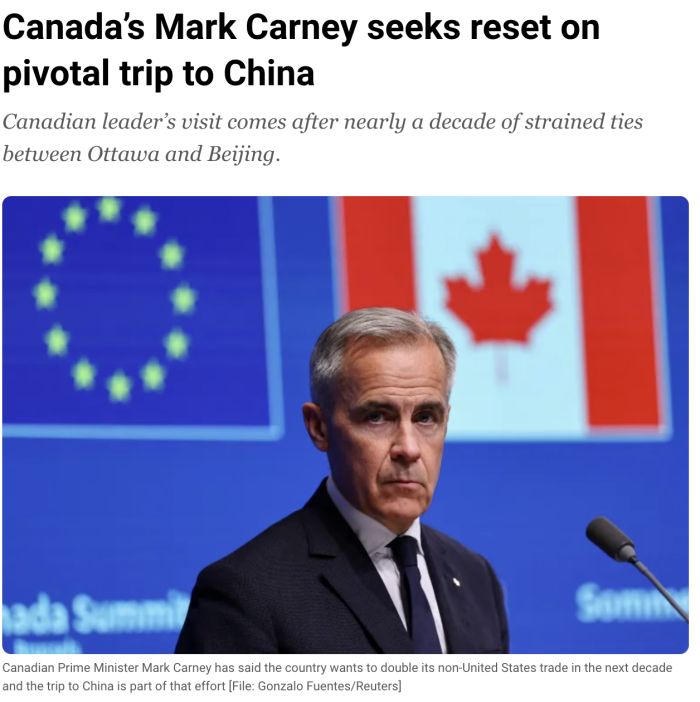
Al Jazeera
Canada’s Mark Carney seeks reset on pivotal trip to China
Al Jazeera, January 15, 2026
Featuring Vina Nadjibulla, Vice-President, Research & Strategy, APF Canada
Excerpt: Against the backdrop of diplomatic tensions with China, Carney’s visit “marks a recalibration and change in tone and signals Canada’s desire to improve relations,” said Nadjibulla.
“This is probably Prime Minister Carney’s second-most challenging trip after his first visit to the White House...the Prime Minister is being pragmatic, and his trip will focus on specific economic deals – selling Canadian energy and agriculture products,” Nadjibulla added, noting that she did not expect to see the full lifting of tariffs between the sides.
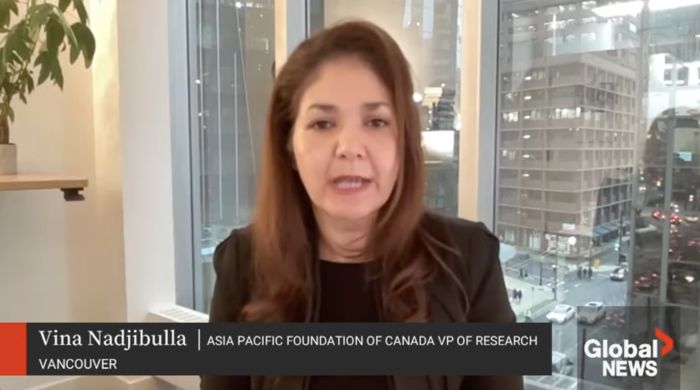
Global News,
Will Carney's visit to Beijing reset Canada-China relations after turbulent decade?
Global News, January 14, 2026
Featuring Vina Nadjibulla, Vice-President, Research & Strategy, APF Canada
Excerpt: Nadjibulla says the diplomatic freeze between Canada and China that started in 2017 was the "lowest period in the relationship and since then, even though there has been some improvement on the political level, when it comes to public opinion, there is still limited trust" from Canadians on co-operation with China.
"Since [Canada's] difficulties with the Trump Administration started about a year ago, we are seeing that attitudes towards China are changing," adds Nadjibulla. "Economic relations will definitely be front and centre" during this meeting, and issues on human rights will likely only be addressed "in private."
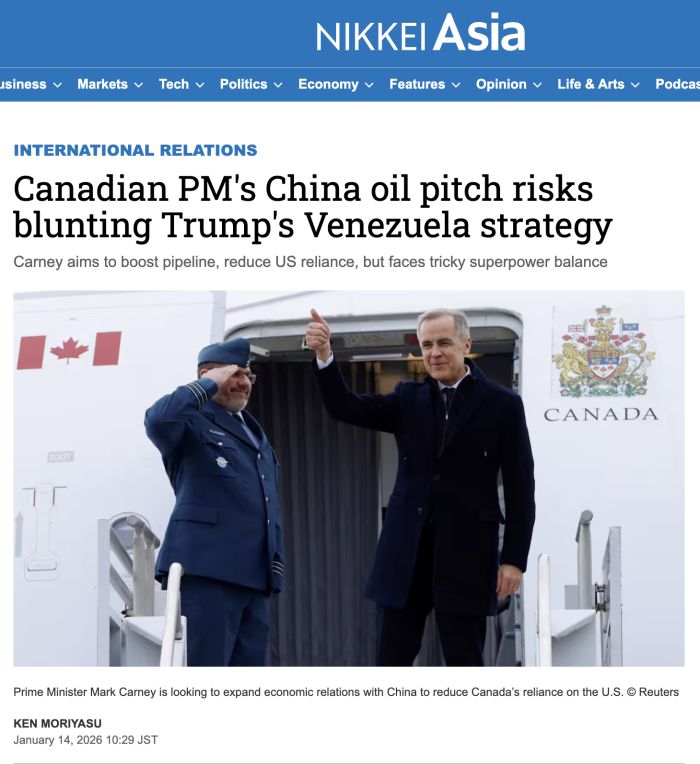
Nikkei Asia
Canadian PM's China oil pitch risks blunting Trump's Venezuela strategy
Nikkei Asia, January 14, 2026
Featuring Vina Nadjibulla, Vice-President, Research & Strategy, APF Canada
Excerpt: Nadjibulla says the expansion of the Trans Mountain Pipeline – a key link between Alberta's oilsands and Pacific ports – gives Canada a rare opportunity to increase shipments to Asia.
"It could potentially be mutually beneficial," she said, noting that China is also seeking new suppliers.

CBC News
Carney heads to Beijing to talk trade after years of diplomatic strain with China
CBC News, January 14, 2026
Featuring Vina Nadjibulla, Vice-President, Research & Strategy, APF Canada
Excerpt: "We're not going to see an immediate resolution. But we likely will see some progress or some signals in terms of where they're heading," said Nadjibulla.
Nadjibulla calls Carney's visit a milestone in Canada-China relations and a big test. The prime minister has to strategically decide what deals he's willing to make and how to manage the risks, she said.
Canada could explore the "European route," she said, and impose a variety of tariffs on specific EVs manufactured in China.
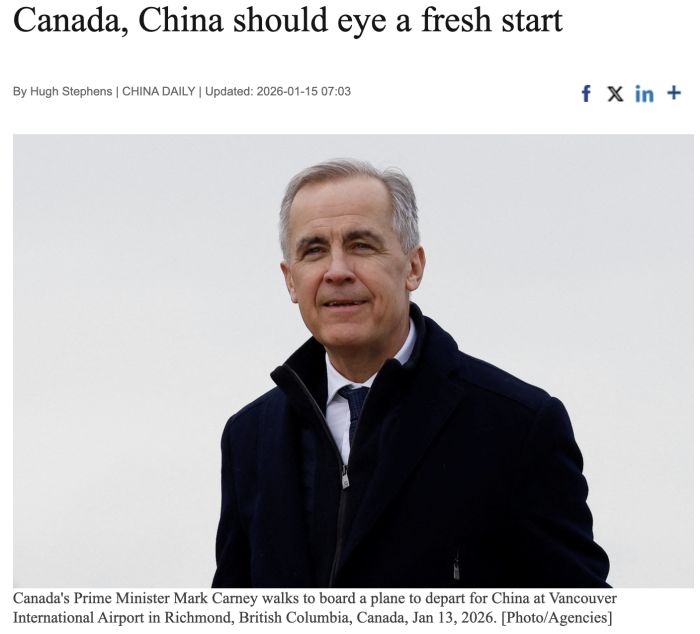
China Daily
Canada, China should eye a fresh start
China Daily, January 14, 2026
Guest Contributor: Hugh Stephens, Distinguished Fellow, APF Canada
Excerpt: "What the Carney visit can do is to reset Canada-China relations in areas where there is scope for co-operation while reserving more difficult areas for further work. Where there are irreconcilable differences, the two sides will have to agree to disagree."
"There is plenty of room to find common ground within the bilateral trade agenda, including energy, dealing with common global issues such as climate change, and exploring ways to relieve the current tariff standoff," wrote Stephens.

CBC - Front Burner
Stuck in the middle: Mark Carney in China
CBC - Front Burner (podcast), January 14, 2026
Featuring Vina Nadjibulla, Vice-President, Research & Strategy, APF Canada
Excerpt: Nadjibulla says "given everything that's happening in Venezuela… energy will be top of the agenda" between PM Carney and Chinese President Xi Jinping.
However, she says the issue of EV tariffs is complicated, "both politically here in Canada...but it is also linked to [Canada’s] relationship with the U.S." While Nadjibulla acknowledges that these tariffs were originally aligned with the Biden Administration, she says there are critical "domestic interests" at play with provincial autoworkers.
She adds that progress in these meetings may be seen as "reduction in tariffs on both sides... a roadmap to [future] negotiations," or a model similar to the EU, which uses reduced tariffs on specific Chinese manufactures and price floors to protect its domestic market.
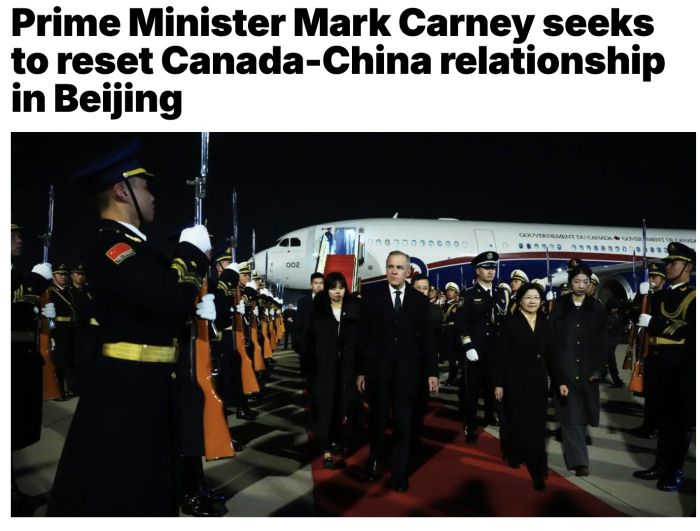
National Newswatch
Prime Minister Mark Carney seeks to reset Canada-China relationship in Beijing
Canadian Press, January 14, 2026
Featuring Vina Nadjibulla, Vice-President, Research & Strategy, APF Canada
Excerpt: Nadjibulla says Carney's visit to China demonstrates the PM's "pragmatic foreign policy in action."
"There is not going to be one word that can describe this relationship, but the public messaging around it needs to continue to be clear-eyed, fully recognizing the complexities of the relationship."
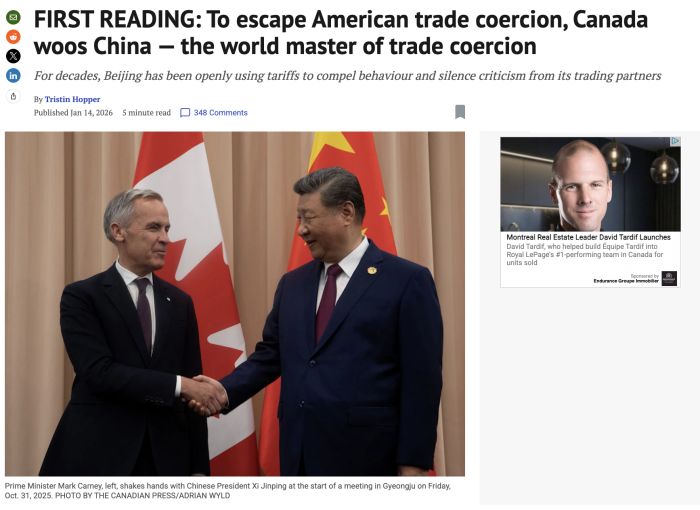
The National Post
FIRST READING: To escape American trade coercion, Canada woos China — the world master of trade coercion
The National Post, January 14, 2026
Featuring Vina Nadjibulla, Vice-President, Research & Strategy, APF Canada
Excerpt: As Carney boarded CanForceOne for Beijing this week, analysts and other China-watchers were warning that although China has plenty of interest in buying Canadian goods, any increase in trade comes with strings attached.
“Canada must remember that China has a track record of using economic relations for political leverage,” reads a recent briefing note prepared by Nadjibulla.
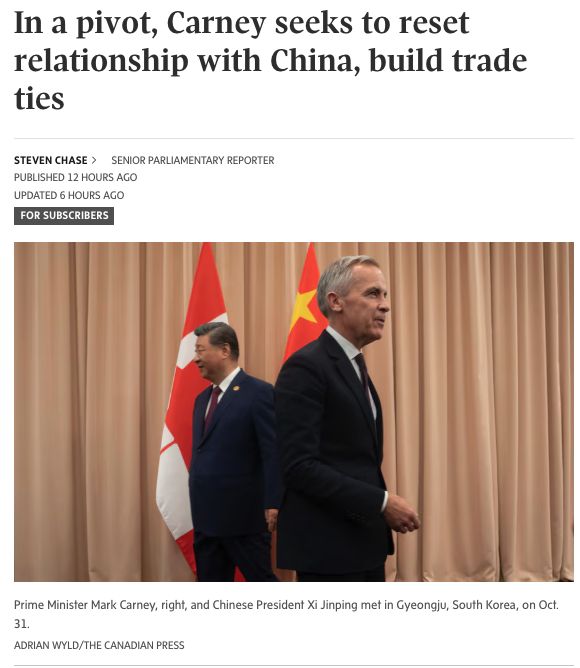
The Globe and Mail
In a pivot, Carney seeks to reset relationship with China, build trade ties
The Globe and Mail, January 13, 2026
Featuring Vina Nadjibulla, Vice-President, Research & Strategy, APF Canada
Excerpt: While Canadian farmers are feeling the squeeze from China's agricultural tariffs, Nadjibulla say that "what’s driving Canada’s shift in relations with Beijing is not China. It’s the circumstances Canada finds itself in," namely, Ottawa's push to diversify beyond U.S. markets.
Despite economic diversification being the name of the game, she warns that China remains a source of threats ranging from “national security, foreign interference, transnational repression, and intellectual property theft."
